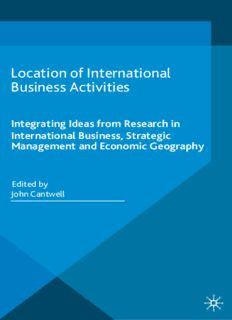
Location of International Business Activities: Integrating Ideas from Research in International Business, Strategic Management and Economic Geography PDF
Preview Location of International Business Activities: Integrating Ideas from Research in International Business, Strategic Management and Economic Geography
Location of International Business Activities Integrating Ideas from Research in International Business, Strategic Management and Economic Geography Edited by John Cantwell Location of International Business Activities This page intentionally left blank Location of International Business Activities Integrating Ideas from Research in International Business, Strategic Management and Economic Geography Editedby John Cantwell RutgersUniversity,Newark,NJ,USA Selection,introductionandeditorialmatter©JohnCantwell2014 Individualchapters©JournalofInternationalBusinessStudies2014 Allrightsreserved.Noreproduction,copyortransmissionofthispublication maybemadewithoutwrittenpermission. Noportionofthispublicationmaybereproduced,copiedortransmitted savewithwrittenpermissionorinaccordancewiththeprovisionsofthe Copyright,DesignsandPatentsAct1988,orunderthetermsofanylicence permittinglimitedcopyingissuedbytheCopyrightLicensingAgency, SaffronHouse,6(cid:1)10KirbyStreet,LondonEC1N8TS. Anypersonwhodoesanyunauthorizedactinrelationtothispublicationmay beliabletocriminalprosecutionandcivilclaimsfordamages. Theauthorshaveassertedtheirrightstobeidentifiedastheauthorsofthiswork inaccordancewiththeCopyright,DesignsandPatentsAct1988. Firstpublished2014by PALGRAVEMACMILLAN PalgraveMacmillanintheUKisanimprintofMacmillanPublishersLimited, registeredinEngland,companynumber785998,ofHoundmills,Basingstoke, HampshireRG216XS. PalgraveMacmillanintheUSisadivisionofStMartin’sPressLLC, 175FifthAvenue,NewYork,NY10010. PalgraveMacmillanistheglobalacademicimprintoftheabovecompanies andhascompaniesandrepresentativesthroughouttheworld. Palgrave®andMacmillan®areregisteredtrademarksintheUnitedStates, theUnitedKingdom,Europeandothercountries. ISBN978(cid:1)1(cid:1)137(cid:1)47230(cid:1)4 Thisbookisprintedonpapersuitableforrecyclingandmadefromfully managedandsustainedforestsources.Logging,pulpingandmanufacturing processesareexpectedtoconformtotheenvironmentalregulationsofthe countryoforigin. AcataloguerecordforthisbookisavailablefromtheBritishLibrary. AcatalogrecordforthisbookisavailablefromtheLibraryofCongress. TypesetbyMPSLimited,Chennai,India. Contents ListofFiguresandTables vi 1 Introduction 1 JohnCantwell 2 MNEsasBorder-CrossingMulti-locationEnterprises:TheRoleof 8 DiscontinuitiesinGeographicSpace SjoerdBeugelsdijkandRamMudambi 3 LocationandtheMultinationalEnterprise:ANeglectedFactor? 35 JohnH.Dunning 4 TheEconomicGeographyoftheInternetAge 63 EdwardE.LeamerandMichaelStorper 5 InternationalEntrepreneurshipandGeographicLocation:An 94 EmpiricalExaminationofNewVentureInternationalization StephnmieA.Fernhaber,BtreeA.Gilbertand PatriciaP.McDougall 6 GlobalCitiesandMultinationalEnterpriseLocationStrategy 137 AnthonyGoerzen,ChristianG.Asmussenand BoB.Nielsen 7 TheHassleFactor:AnExplanationforManagerialLocational 181 Shunning AndreasSchotterandPaulW.Beamish 8 RegulatoryEnvironmentsandtheLocationDecision:Evidence 226 fromtheEarlyForeignMarketEntriesofNew-Technology-based Firms RégisCoeurderoyandGordonMurray 9 LocationandtheMultinationalEnterprise 261 JohnCantwell Index 274 v List of Figures and Tables Figures 2.1 Relativelylowsub-nationalspatialheterogeneity 16 2.2 Relativelyhighsub-nationalspatialheterogeneity 16 2.A1 TheDunningeffect 32 2.A2 TheGhemawateffect 33 4.1 U.S.tradewithMexicoandCanadaaspercentofU.S.exports andimports 66 4.2 WestGermantradingpartners,1985 70 4.3 Accesstomarketsandpercapitaincome,1960and1990 72 5.1 Relationshipbetweenclusterconcentrationandinternational intensity(inflectionpoint=8.6) 120 5.2 Relationshipbetweenclusterconcentrationandinternational scope(inflectionpoint=8.2) 120 5.3 Moderatingeffectsofsizeontherelationshipbetweencluster concentrationandinternationalscope 121 5.4 ModeratingeffectsofR&Dintensityontherelationship betweenclusterconcentrationandinternationalscope 122 5.5 Moderatingeffectsofinternationalexperienceonthe relationshipbetweenclusterconcentrationandinternational intensity 123 7.1 Researchmodel 190 7.2 Hasslefactorconstruct 192 Tables 3.1 Somevariablesinfluencingthelocationofvalueadded activitiesbyMNEsinthe1970sand1990s 47 4.1 OECDtrade(exportsplusimports)betweenadjacent countries,islandnationsandothers(percentoftotaltrade percategory) 68 vi ListofFiguresandTables vii 4.2 Messages 75 4.3 Messages,transactionsandlocationofstandardizedand specializedproducts 81 4.4 ExamplesofpotentialchangesintheInternetage 84 5.1 Summaryofsample(n=156) 105 5.2 Clustermeasuresoflocationsrepresentingnewventuresin oursample(2000datashown) 108 5.3 Clusterlocationquotientoflocationsrepresentingnew venturesinoursample 112 5.4 Correlations,meansandstandarddeviations(n=156) 116 5.5 Regressionresults:internationalintensitydependentvariable 118 5.6 Regressionresults:internationalscopedependentvariable 119 6.1 Globalcitiesandtheliabilityofforeignness 147 6.2 Arosterofworldcities 155 6.3 Correlationsanddescriptivestatistics 160 6.4 MNEinvestmentlocationinglobalcities 161 6.5 Multilevelmultinomiallogisticregressionmodelsofglobal citylocation 163 7.1 Datasources 196 7.2 Descriptivestatistics:bivariatecorrelations,means,and standarddeviations 200 7.3 Loadings(finalmodel) 201 7.4 Discriminantvalidity 202 7.5 Summaryofpathestimates 204 7.6 Robustnesstest 206 7.7 Hasslefactorscoresbycountry 208 8.1 ForeignentrychoicesbyNTBFs(binomiallogitmodel) 243 8.2 PreferencesofforeignentriesbyNTBFs(rank-orderedlogistic regressionmodel) 245 8.3 ForeignentrytimingbyNTBFs(Coxregression) 247 8.A1DescriptivestatisticsandPearsoncorrelations amongvariables 260 This page intentionally left blank 1 Introduction John Cantwell RutgersUniversity,Newark,NJ,USA Inrecentyearsanextensiverangeofnewresearchhasbeenrevisitingthe topicofthe locationofinternational businessactivitiesfrom avarietyof different perspectives and background interests. This work has been inspired in part by two apparently quite different but actually related contemporarytrends:ontheonehand,anemergenceorrevitalizationof clustersofactivitiesco-locatedinandaroundselectedglobalcityregions orfast growing metropolitanareas;and onthe other hand, an increased globaldispersionofactivitiesconductedwithinthevaluechainsmanaged orcoordinatedbymanylargemultinationalenterprises(MNEs)andtheir businesspartners. Theformertrendhasgivenrisetodiscussionsofhowtheeliteofthe cultural-cognitiveeconomy ofthe21stcentury(inAllenScott’s[2012] terminology) or the creative class (Richard Florida’s [2002] term) are now being drawn or brought back to major urban centers; while the latter trend is associated with debates over outsourcing, and the economic and social consequences of shifts in the ownership and location of distinct nodes of value chains once production systems become more fragmented and the component parts of such systems become more geographically dispersed. Anincreasedinterestinthesubjectofinternationalbusinesslocationhas been shown by scholars in Strategic Management, in Economic Geogra- phy,andinRegionalScience,aswellasinourowninterdisciplinaryfieldof InternationalBusinessStudies.However,asisoftenthe caseinacademic researchcommunities,thesebodiesofscholarshiphavetendedtodevelop atsomethingofadistance fromone another, eachconversinginternally more than they have with one another. For an earlier attempt to bring together especially the Economic Geography and International Business literaturesonlocationseeIammarinoandMcCann(2013). 1
Description: